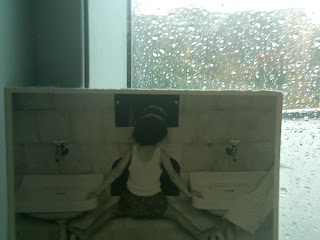I once got to interview Deborah Britzman...yes of
Practice makes Practice but really, in that moment at Bergamo, she was of
Novel Education. Like any good analysis, I walked away with two distinct koans to beacon me through the rough waters of trying to write my prospectus, proposal and research. One was an aside...or maybe a culmination of a long and vastly erudite exploration of a fine point of Freud's. (The only other time I've been so in awe and in over my head was when I met Borges and he recited his poetry from memory. But I digress. Analysts may now smile wryly.) First this "aside" was "I worry about torture." I will write more about that later. But yes, I worry nearly obsessively about it. It is my chief concern, oddly enough. But when you consider that I did indeed have a teacher that required students to stand in corners holding stacks of encyclopedias, this may not be so surprising. But yes, I worry about torture; I think it is, in fact, our central concern in living together. And genociede, too while we're at it. And fascist regimes that disappear people. These were the terrors of my maturing years and they remain the hauntings that drive my efforts. I simply concluded that the best attempt at redress was to address the beginnings. Sometimes, now, I am in despair. I feel trapped in a system that neatly herds us all, critics included, towards the truck, the train car, the uniform. I think Deborah was musing upon that, maybe. How sneaky the disaster is, how torture sidles in on little token economy feet.
The other thing she said that stayed with me was "bite and suck, bite and suck"...chuckling at the universal dialectic of the love and antagonism tango that operates through virtually all human interaction. THIS phrase has been popping to my mind's surface like a cork in a washtub, a bobber where the fish got away. I nursed three babies so I'm acquainted with the bite and the suck and one thing that occurs to me is the varieties of both that a nursing mother experiences. Most of us can relish and say "awwwww" around the sweet sucking notion. It's the bite we like to avoid considering. But, as an early childhood person, I know that the bite cannot be avoided. Babies bite. And they do it for an amazing array of reasons in an amazing array of ways. Biting is the bane of a Nursery School director's life, I can tell you.
But I'll speak as the mother, here. I'll put my well-nursed breast on the line, so to speak. Biting in that nursing situation has been oversimplified, I think, yes, even by the psychoanalytic folks. I need to read up more BUT I think that to portray that bite as only antagonism, of the wrestling aversion to utter dependence and the feasone growl of "why am I here?!"....it leaves out another bite that most nursing mothers know quite well. First, on the classic bite--oh yes, ALWAYS happens--at least once. Usually, only once or maybe twice and boy howdy, the wearer of the breast's reaction pretty well ensures that particular bite doesn't happen again. It's a moment, for sure. And bears much consideration and decontructing. BUT
There's another bite and it's the one that the more mature nurser masters--it's the pulling bite that doesn't QUITE become chomp but is instead is a press for "MORE." It's what that classic kitten paw dance does--it's a fierce and effective effort to get MORE, c'mon MORE milk to flow. Most mothers do not pull away from this one. First of all, it usually arrives gradually so we build a tolerance. Secondly, some part of us knows what's going on, that our nurser is coaxing our body to step it up, send out a call for more, yet again more--both this time and from here on out, because that's how the system works.
This bite, too, is in the bite and suck only it's not the same bite as the other bite. It is still painful, let me tell you, but it is not the chomp of "eat you up" or the roar of "what are you that I must have you always?!" It is the mmmmmmmmMMMMMMMOOOOOOORE bite....I don't think bite is the right word; that word has too much chop to it. Maybe "gnnnnuck" for gnaw and suck.
But my point is that there is this third way. There's another step in the tango--it's not just bite and suck--there's a blend in there that 's made of pure pragmatic effort, yes with a strain of "me--I want" but tempered with continued connection and sustained enjoyment. It's a hybrid--a embracing beast. There are implications here, I think, for the roots of sublimation. For the beginnings of communication beyond and through communion.
Just watch the teeth, dear one, watch the teeth.





























